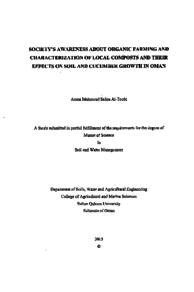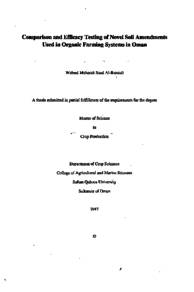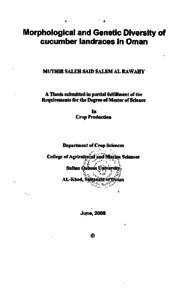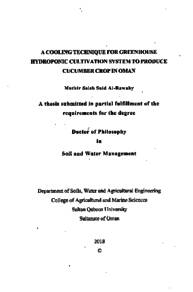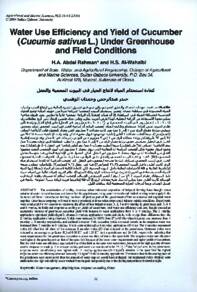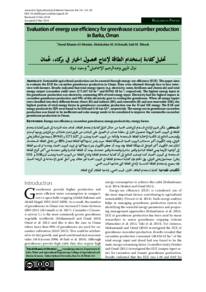Document
Society's awareness about organic farming and characterization of local composts and their effects on soil and cucumber growth in Oman
Publisher
Sultan Qaboos University
Gregorian
2015
Language
English
Subject
English abstract
Abstract
Organic farming is one of the fastest growing sectors of agriculture in the world. In Oman, there is an interest of the Ministry of Agriculture and Fisheries to introduce organic farming in the agricultural system. However, society's awareness about organic farming and their tendency to adopt this farming are important factors in the planning for introducing organic farming to the sultanate. Compost is considered as an important component in organic farming because it not only fulfills the nutrients requirements of the plants but also improves soil physicochemical and biological properties. There are many locally made composts available in the market, but still the types of local composts that can be used in organic farming are not well defined. Therefore, this study was conducted to (i) evaluate society's awareness about organic farming and their willingness to get suitable compost for their farms (ii) to compare the physiochemical and biological properties and presence of pathogenic microbes in the locally made composts and (iii) to evaluate the potential of using locally made composts in organic farming considering characteristics of soil in Oman. In the first part of this study, society's awareness about organic farming and their willingness to get suitable compost for their farms were studied by conducting a survey which covered citizens in Sultanate of Oman from different places, ages, education level and area of interest. In the second part, three different types of locally made compost referred in this thesis as DC, KC and AC were examined. DC is approved as certified organic compost and used for producing certified organic products in farms that belong to Royal of Diwan Court in Oman. KC is produced by Haya Water Company to enable the efficient re-use of sewage biosolids. AC is produced by the Agricultural Experimental Station (AES) at Sultan Qaboos University to reuse the animal waste and plant residues. eu In organic farming survey, 60 questionnaires were distributed among different people from different institutions personally, answered questionnaires were collected and analyzed. In examining locally made composts, all composts were characterized for physicochemical and biological properties including, moisture contents, EC, pH, all the macro and micronutrients, toxic metals, total organic carbon, organic matter and C/N ratio. Then a greenhouse experiment was setup at AES in Sultan Qaboos University to study the effect of locally made composts on soil properties and growth of cucumber plants. Certified organic seeds were grown and the growth rate of cucumber plants was monitored and recorded. After harvesting, samples were collected from the soil and plants for analysis of yield parameters and soil physicochemical and biological characteristics. The results showed that more than half of participants had simple basic background about organic farming and they preferred to use organic compost than synthetic fertilizers. 68% of the survey respondents believed that there is possibility to adopt organic farming in Oman and 19 % thought that this farming can't be adopted because of agricultural pest and the poor fertility of soil. The characterization of the all the composts for their physicochemical and biological properties revealed that the properties of DC and AC composts were within the standards of organic compost while the properties of KC compost were out of the standards as amounts of nitrogen and organic matter were above the limits. Examination of viable pathogenic bacteria showed that there were no pathogenic bacteria in either compost which implies that both traditional and modern composting processes used in the preparation of AC, DC and KC composts, respectively, were able to destroy all pathogenic bacteria. Plants performance was excellent with application of all composts which could be attributed to the improvement in soil characteristics, but the maximum increases in cucumber growth were recorded in KC that could be due to the presence of high amounts of nitrogen and organic matter. Therefore, the use of locally made composts could be highly beneficial for improving crop yields in Oman and good candidates for organic farming. Nonetheless long term trials are still needed to find out the appropriate rates of locally made organic composts and their effects on soil characteristics and yields of different crops under field conditions
Member of
Resource URL
Arabic abstract
الخلاصة
الزراعة العضوية هي واحدة من أسرع القطاعات نموا في الزراعة. هناك اهتمام من قبل وزارة الزراعة والثروة السمكية لإدخال الزراعة العضوية الى نظام الزراعة في سلطنة عمان. لذلك فان مدى معرفة الأفراد بهذه الزراعة ورغبتهم لتطبيقها يعتبر عنصر مهم في التخطيط نحو هذه الخطوة. كذلك يعتبر استخدام الإسمدة في هذه الزراعة عنصر أساسي لا غنى عنه. لذلك، أجريت هذه الدراسة من أجل (1) تقييم وعي المجتمع حول الزراعة العضوية ورغبتهم في الحصول على السماد العضوي مناسبة لمزارعهم (2) المقارنة الخصائص الفيزيائية والبيولوجية و وجود الميكروبات المسببة للأمراض في الأسمدة المصنوعة محليا و (3) لتقييم إمكانية استخدام هذه الأسمدة في الزراعة العضوية مع الأخذ بعين الاعتبار خصائص التربة في عمان من أجل ذلك تم عمل استطلاع لمعرفة وعي المجتمع حول الزراعة العضوية ورغبتهم في الحصول على السماد العضوي مناسبة لمزارعهم عن طريق توزيع استبيان على أفراد من قطاعات و مستويات تعليمية مختلفة. كذلك تم فحص ثلاثة أنواع مختلفة من الأسمدة المصنوعة محليا DC و KC وAC عن طريق تحلیل خواصها الفيزيائية و الكيميائية والجرثومية بما في ذلك نسبة الرطوبة و الملوحة ودرجة الحموضة pH و جميع العناصر الغذائية الكبرى والصغرى والمعادن السامة و الكربون العضوي الكلي، والمواد العضوية ونسبة C / N أظهرت النتائج، أن أكثر من نصف المشاركين لديهم خلفية بسيطة عن الزراعة العضوية، وأنهم يفضلون استخدام السماد العضوي عن الأسمدة الاصطناعية. 68% منهم يعتقدون أن هناك إمكانية لاعتماد الزراعة العضوية في عمان و 19% يعتقدون أن هذه الزراعة لا يمكن اعتمادها بسبب الأفات الزراعية و قلة خصوبة التربة. كذلك وجد أن خصائص سمادي AC و DC ضمن المعايير العالمية للأسمدة العضوية. أما سماد KC فانه لا تنطبق عليه هذه الشروط بسب نسبة النيتروجين والمواد العضوية العالية فيه والتي تعتبر مناسبة لطبيعة التربة العمانية التي تعاني من نقص في النيتروجين والمواد العضوية وهذا يفسر نمو نبات الخيار وانتاجه العالي مقارنة بالأسمدة الأخرى. كذلك أظهرت الدراسة أن نسبة الملوحة العالية في هذه الأسمدة يمكن تخفيفها بعملية الرشح عن طريق الري قبل زراعة النبات.
الزراعة العضوية هي واحدة من أسرع القطاعات نموا في الزراعة. هناك اهتمام من قبل وزارة الزراعة والثروة السمكية لإدخال الزراعة العضوية الى نظام الزراعة في سلطنة عمان. لذلك فان مدى معرفة الأفراد بهذه الزراعة ورغبتهم لتطبيقها يعتبر عنصر مهم في التخطيط نحو هذه الخطوة. كذلك يعتبر استخدام الإسمدة في هذه الزراعة عنصر أساسي لا غنى عنه. لذلك، أجريت هذه الدراسة من أجل (1) تقييم وعي المجتمع حول الزراعة العضوية ورغبتهم في الحصول على السماد العضوي مناسبة لمزارعهم (2) المقارنة الخصائص الفيزيائية والبيولوجية و وجود الميكروبات المسببة للأمراض في الأسمدة المصنوعة محليا و (3) لتقييم إمكانية استخدام هذه الأسمدة في الزراعة العضوية مع الأخذ بعين الاعتبار خصائص التربة في عمان من أجل ذلك تم عمل استطلاع لمعرفة وعي المجتمع حول الزراعة العضوية ورغبتهم في الحصول على السماد العضوي مناسبة لمزارعهم عن طريق توزيع استبيان على أفراد من قطاعات و مستويات تعليمية مختلفة. كذلك تم فحص ثلاثة أنواع مختلفة من الأسمدة المصنوعة محليا DC و KC وAC عن طريق تحلیل خواصها الفيزيائية و الكيميائية والجرثومية بما في ذلك نسبة الرطوبة و الملوحة ودرجة الحموضة pH و جميع العناصر الغذائية الكبرى والصغرى والمعادن السامة و الكربون العضوي الكلي، والمواد العضوية ونسبة C / N أظهرت النتائج، أن أكثر من نصف المشاركين لديهم خلفية بسيطة عن الزراعة العضوية، وأنهم يفضلون استخدام السماد العضوي عن الأسمدة الاصطناعية. 68% منهم يعتقدون أن هناك إمكانية لاعتماد الزراعة العضوية في عمان و 19% يعتقدون أن هذه الزراعة لا يمكن اعتمادها بسبب الأفات الزراعية و قلة خصوبة التربة. كذلك وجد أن خصائص سمادي AC و DC ضمن المعايير العالمية للأسمدة العضوية. أما سماد KC فانه لا تنطبق عليه هذه الشروط بسب نسبة النيتروجين والمواد العضوية العالية فيه والتي تعتبر مناسبة لطبيعة التربة العمانية التي تعاني من نقص في النيتروجين والمواد العضوية وهذا يفسر نمو نبات الخيار وانتاجه العالي مقارنة بالأسمدة الأخرى. كذلك أظهرت الدراسة أن نسبة الملوحة العالية في هذه الأسمدة يمكن تخفيفها بعملية الرشح عن طريق الري قبل زراعة النبات.
Category
Theses and Dissertations

